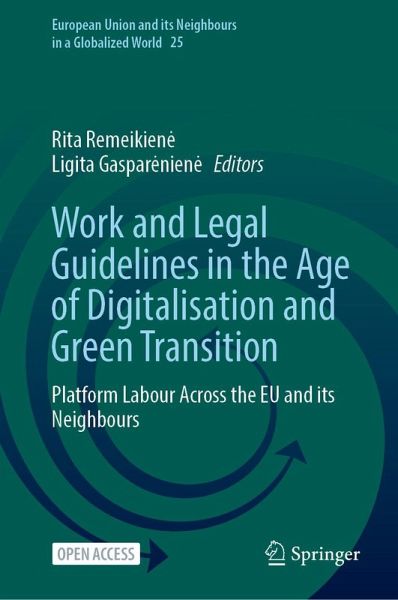
Work and Legal Guidelines in the Age of Digitalisation and Green Transition
Platform Labour Across the EU and its Neighbours
Herausgegeben: Remeikien_, Rita; Gaspar_nien_, Ligita
Versandkostenfrei!
Versandfertig in 6-10 Tagen
38,99 €
inkl. MwSt.

PAYBACK Punkte
19 °P sammeln!
This open access book provides important insights into the integration of digitalisation and green economy into the platform economy, and how these processes can contribute to the improvement of legal labour regulations and processes in the EU and Eastern Europe. It addresses the following key topics: the impact of digitisation on the labour market, including the impact of robotics and automation on the changing nature of work; the organisation of work through digital platforms; the relationship between workers and employers; the challenges of implementing the Green Deal strategy in the labour...
This open access book provides important insights into the integration of digitalisation and green economy into the platform economy, and how these processes can contribute to the improvement of legal labour regulations and processes in the EU and Eastern Europe. It addresses the following key topics: the impact of digitisation on the labour market, including the impact of robotics and automation on the changing nature of work; the organisation of work through digital platforms; the relationship between workers and employers; the challenges of implementing the Green Deal strategy in the labour market; the specifics and types of platform work; problems concerning labour regulation on digital platforms in Eastern and Southern European countries, such as Moldova, Ukraine, Bosnia and Herzegovina, Serbia, Montenegro and Albania; and the results of an empirical survey.
The topics are highly relevant in the contemporary context, as the European Parliament adopted the Platform Work Directive in 2024 after several years of debate. This Directive aims to sift out the working patterns of the platform sector, introducing clear criteria on what is considered to be an individual activity and what is considered to be an employment relationship. The EU Directive calls upon each EU country to develop its own criteria for assessing whether certain work carried out via platforms is based on an employment relationship or merely constitutes an individual activity.
One of the book s main objectives is to present possible business models for digital platform work that offer greater social protection for the worker by analysing the theoretical aspects of digitalisation and the integration of the green economy into the labour market, and the legal framework for digital labour market platforms in Eastern and Southern European countries. The book will be of interest to policymakers responsible for regulation of the labour market, trade unions, university lecturers and students of economics and law who are interested in delving into the characteristics and regulation of the digital economy and the digital labour market, labour platform workers and employers.
The topics are highly relevant in the contemporary context, as the European Parliament adopted the Platform Work Directive in 2024 after several years of debate. This Directive aims to sift out the working patterns of the platform sector, introducing clear criteria on what is considered to be an individual activity and what is considered to be an employment relationship. The EU Directive calls upon each EU country to develop its own criteria for assessing whether certain work carried out via platforms is based on an employment relationship or merely constitutes an individual activity.
One of the book s main objectives is to present possible business models for digital platform work that offer greater social protection for the worker by analysing the theoretical aspects of digitalisation and the integration of the green economy into the labour market, and the legal framework for digital labour market platforms in Eastern and Southern European countries. The book will be of interest to policymakers responsible for regulation of the labour market, trade unions, university lecturers and students of economics and law who are interested in delving into the characteristics and regulation of the digital economy and the digital labour market, labour platform workers and employers.












